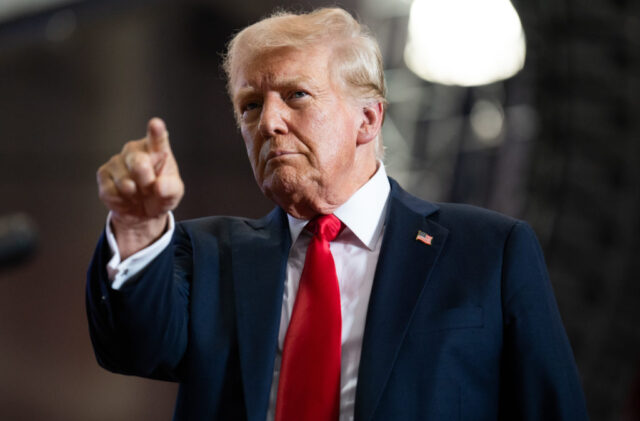America Is Becoming the World’s Largest Tax Haven | By Joseph E. Stiglitz | Donald Trump is quickly turning the United States into the greatest tax haven in history. One need only note the Treasury Department’s mandate to withdraw from the transparency regime that shares the real identities of company owners; the administration’s withdrawal from negotiations to establish a UN Framework Convention on International Tax Cooperation; its refusal to enforce the Foreign Corrupt Practices Act; and massive crypto de-regulation.
This seems to be part of a broader strategy to undermine 250 years of institutional safeguards. The Trump administration has violated international treaties, ignored conflicts of interest, dismantled checks and balances, and impounded congressionally allocated funds. The administration isn’t debating policy; it’s trampling the rule of law.
But Trump does love one tax: import tariffs. He appears to believe that foreigners are footing the bill, thereby providing the money to cut taxes for billionaires. He also seems to believe that tariffs will eliminate trade deficits and return manufacturing to the US. Never mind that tariffs are paid by importers, driving up domestic prices, and are being levied at the worst time possible, just as the US is recovering from an inflationary episode.
Moreover, elementary macroeconomics shows that multilateral trade deficits reflect the disparity between domestic savings and domestic investment. Trump’s tax cuts for billionaires will widen the gap, because deficits subtract from domestic national savings. So, ironically, policies like tax cuts for billionaires and corporations increase the trade deficit.
Since Ronald Reagan, conservatives have claimed that tax cuts pay for themselves by boosting economic growth. But it didn’t work that way for Reagan, and it didn’t work that way for Trump during his first term. Empirical research confirms that tax cuts for the rich have no measurable impact on economic growth or unemployment, but do increase income inequality immediately and persistently. The proposed extension of the 2017 Tax Cuts and Jobs Act – the biggest corporate tax cuts in US history – would add around $37 trillion to the US national debt over the next 30 years, without delivering the promised economic boost.
Trump is worsening the trade deficit at the microeconomic level, too. The US has become a service economy. Among its largest exports are tourism, education, and health care. But Trump has systematically undermined each. What tourist, student, or patient would want to come to the US knowing that he could be arbitrarily detained and held for weeks? The undermining of America’s premier education institutions, the arbitrary cancellation of student visas, and the defunding of science research have cast a deep pall over these critical sectors.
Trump’s strategically flawed approach is already backfiring. China is one of America’s biggest trading partners, and the US depends on it for critical imports. China has already retaliated. Fear of stagflation – higher inflation combined with stagnant growth – has hit the stock and bond markets. And this is just the beginning.
Thanks to Elon Musk’s Department of Government Efficiency, tax revenues could plummet by over 10% this year because of weaker enforcement and compliance. A reduction of some 50,000 IRS workerswould result in $2.4 trillion of forgone revenue over the next ten years, compared to the projected $637 billion increase under provisions of the Inflation Reduction Act that aimed to boost the IRS workforce. The agenda is clear: not just lower tax rates for the rich, but weaker enforcement.
In a world where capital and rich individuals can cross borders freely, international cooperation is the only way for governments to ensure that multinational corporations and the ultra-rich are fairly taxed. In this context, halting the enforcement of beneficial-ownership data collection, tolerating anonymity-enhancing crypto markets, and abandoning the process to conclude a new UN tax convention and a global minimum tax reveal a deliberate pattern: dismantling multilateral frameworks designed to combat tax avoidance and money laundering. The “pausing” of enforcement of the Foreign Corrupt Practices Act indicates that the US no longer minds even bribery and graft.
What we are witnessing is an apparent attempt by Trump, Musk, and their billionaire cronies to forge a kind of capitalism modeled after the lawless zones of the offshore world. It’s not just a tax revolt; it’s an all-out assault on any law that threatens the extreme accumulation of wealth and power.
Nowhere is this more evident than in their embrace of crypto. The explosion of underregulated crypto exchanges, online casinos, and betting platforms has boosted the global illicit economy. Under Trump, the Treasury Department has lifted sanctions and regulations on platforms that obfuscate transactions. Trump has even signed an executive order to establish a “strategic cryptocurrency reserve” and has held the first White House crypto summit. The US Senate followed suit, killing a provision that would have required crypto platforms to identify and report users.
Trump, who himself issued a controversial meme coin and may soon launch a crypto-based video game based on “Monopoly,” has now installed a crypto insider at the helm of the Securities and Exchange Commission. Paul Atkins is a member of a policy group that advocates for crypto assets and non-bank financial systems.
Cryptocurrencies are about one thing: secrecy. We have perfectly good currencies in the dollar, the yen, the euro, and others. And we have efficient trading platforms for buying goods and services. Demand for cryptocurrencies comes from the desire to hide money. People involved in nefarious activities, including money laundering and tax avoidance and evasion, don’t want what they do to be easily traceable.
The rest of the world cannot stand by and watch. We’ve seen that global cooperation canwork, as shown by the global 15% minimum tax on the profits of multinationals, which more than 50 countries are now introducing. Within the G20, the consensus forged last year under Brazil’s leadership calls for the superrich to pay their fair share.
The US has distanced itself from international agreements but, paradoxically, the absence of its diplomacy may help strengthen multilateral negotiations to deliver a more ambitious outcome. In the past, the US would demand that an agreement be weakened (typically to benefit one special interest or another), but in the end, would refuse to sign. This is what happened during the OECD negotiations for the taxation of multinational corporations. Now, the rest of the world can get on with the task of designing a fair and efficient global tax architecture.
Addressing extreme inequality through international cooperation and inclusive institutions is the real alternative to rising authoritarianism. America’s self-isolation creates an opportunity to rebuild globalization on truly multilateral grounds – a G-minus-one for the twenty-first century.
About the author: Joseph E. Stiglitz, a former chief economist of the World Bank and former chair of the US President’s Council of Economic Advisers, is University Professor at Columbia University, a Nobel laureate in economics, and the author, most recently, of The Road to Freedom: Economics and the Good Society (W. W. Norton & Company, Allen Lane, 2024).
America Is Becoming the World’s Largest Tax Haven | Copyright: Project Syndicate, 2025. www.project-syndicate.org.
























